It's amazing what the prospect of a chocolate milkshake can do to individuals who live to eat. Certain areas of their brains that are known to be involved in drug craving shift into gear.
This is the finding of Ashley Gearhardt, a doctoral student in clinical psychology at Yale University, and her colleagues. And the results of their research, which appeared in the August Archives of General Psychiatry, suggest that an overwhelming urge to eat is no less than a form of addiction.
And these results, along with those from other addiction researchers (Psychiatric News, April 15), appear to validate the view of Nora Volkow, M.D., head of the National Institute on Drug Abuse, who asserted in 2007 that some forms of obesity are due to an addiction to food.
Gearhardt and colleagues recruited 48 healthy young women for their study. The women had been enrolled in a program to help people achieve and maintain a healthy weight on a long-term basis. The women were on average 21 years old and ranged in weight from lean to obese.
The researchers gave the subjects a questionnaire that measures food addiction—the Yale Food Addiction Scale. The instrument asks respondents to rate the extent to which they agree with questions such as "I find that when I start eating certain foods, I end up eating much more than planned," "I find myself continuing to consume certain foods even though I am no longer hungry," and "I eat to the point where I feel physically ill."
The subjects were then shown a picture of a chocolate milkshake and promised delivery of a real one. After that, their brain activity was visualized with functional magnetic resonance imaging. The scientists then looked to see whether there was any link between subjects' food addiction scores and their brain activity.
There was. The higher subjects' food addiction scores were, the greater their brain activity in the anterior cingulate cortex, the medial orbitofrontal cortex, the amygdala, and the caudate. These brain areas have also been implicated in drug craving.
Thus it looks as if an overwhelming urge to eat may be a form of food addiction, and that food addiction in turn may contribute to obesity, the researchers believe.
"I was surprised by the strength of our findings—all medium and large effects—because we excluded all [study candidates] who met a clinical threshold for eating disorders," Gearhardt told Psychiatric News. "If we had included such people, we would likely have had even stronger findings."
However, no significant correlation was found between food-addiction scores on the questionnaire and subjects' body mass index. In other words, some of the lean subjects, not just the obese ones, scored high on this instrument.
"It is possible that some individuals experience compulsive eating behavior, but engage in compensatory behaviors to maintain a lower weight," Gearhardt and her team suggested. "An alternative possibility is that lean participants who endorse food addiction are at risk for future weight gain. Given the young age of the sample, on average 21 years, the probability of future weight gain may be especially likely."
Regarding clinical implications of their findings, Gearhardt said, "I think our research suggests that clinical techniques used in addiction such as motivational interviewing or cue-exposure response-prevention may be particularly effective for some people struggling with eating-related issues. It also highlights the impact that addictive foods may have on the reward system in the brain, which could suggest the use of pharmacology, like opioid antagonists, to treat eating problems."
Gearhardt and her group are next planning to conduct a study that looks at food addiction and neural response to food advertising, she said.
Food-addiction behaviors have been demonstrated in both lab animals and humans in a wide range of studies, Mark Gold, M.D., chair of psychiatry at the University of Florida and a food-addiction researcher, told Psychiatric News. Yet most clinicians have not been able to capitalize on these findings, because there has been no way to reliably identify who is and who isn't a food addict, he said. But now there is, he said, because "this study has provided the first neurobiological validation of the use of the Yale food addiction instrument in obese and normal individuals."
The study was funded by the National Institutes of Health.

